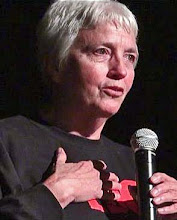
Of all the phrases I've heard when people talk about homelessness, "One paycheck away..." is most frequently cited to show a person has a clue, and empathy, about homelessness.
Why, if the average person I talk to understands this, do our legislators and policymakers struggle with the concept that families fall in the "one paycheck away" category?
I'm reading HUD's first report to Congress (the "evil Diane" wonders why HUD never bother reporting before, and wonders how much was spent on this piece of work.) I must work quite hard at self control as I read HUD's reassurance that homelessness isn't any worse now than 10 years ago. Oh pl-eee-aaa-sss-e!
The most frustrating omission is the slick ignoring of the existence of families. H-E-L-L-O! Family homelessness, along with unaccompanied youth homelessness, is exploding. Just ask my new friend Kathy Wiggins, homeless student liaison in Tampa. This area, besides having an abundance of palm trees, is overwhelmed with families living in all kinds of horrible, highly-mobile conditions. Hey HUD, they are H-O-M-E-L-E-S-S!!!
What would "homeless czar" Phil Mangano say about these folks whose plight was reported on Tampa's local news (VIDEO)? I truly want to know. How can HUD offer the absolutely ridiculous number of 754,000 homeless people (which they say is a "one-night count," a phrase designed to confuse even the enlightened) and not at least give a horrified side-note explanation that their number represents such a gross undercount, specifically of non-urban areas and families, that our nation needs to be embarrassed?
Some disturbing/absurd HUD comments include: "In comparing these results with those of previous studies, there is no evidence that the size of the homeless population has changed dramatically over the past ten years," (pg iii) and, "Homelessness is concentrated in central cities rather than in suburban or rural areas," (pg vi). I'm stopping with those 2. Read it yourself if you need evidence that homeless kids are being prepared to be homeless adults of the future by being ignored today.
Of course, the most glaring omission is the fact that HUD chooses to use the definition of "chronic" homelessness which virtually eliminates children and youth. "A chronically homeless person is defined as an unaccompanied homeless individual with a disabling condition who has either been continuously homeless for a year or more OR has had at least four episodes of homelessness in the past three years. To be considered chronically homeless a person must have been on the streets or in an emergency shelter (i.e., not transitional housing) during these stays." That fails the "keep it short, stupid" KISS test.
Across this nation, in urban, suburban, and rural areas, families and teens face the bleak realities of homelessness. Sometimes they weren't even a paycheck away when it hit. Sometimes--quite often in fact--the mom and kids hit the streets because of domestic violence. Julianna's story is sadly typical.
Seems to me that the first step of doing something about a problem is learning about it. With unabashed self-interest in working myself out of a job, I recommend that our HUD friends watch My Own Four Walls, a powerful account of what kids think about their homelessness. Then adopt the "one step away" language. At least you can fake sounding like you know what's up....











